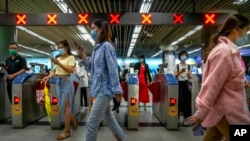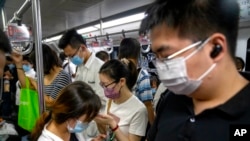In 1999, fewer than 1 million people graduated from college in China. This year, a record-breaking 10.7 million new college graduates joined the Chinese job market.
And many of them face a tough time finding jobs, according to official data.
Youth unemployment in China reached 19.9% in July, according to the latest data released by the country’s National Bureau of Statistics. That’s the highest rate since Beijing started publishing the index in January 2018, when the rate was as low as 9.6%.
July’s high unemployment rate for youth aged 16-24 — up from a previous record high of 19.3% in June — is largely due to an economic slump that China has been experiencing over the past few years, multiple China analysts told VOA Mandarin. That economic downturn has been exacerbated by the COVID-19 pandemic and Beijing’s strict containment restrictions, including the “Zero COVID” policy, which reduced exports and consumer spending.
“They’re reaping what they’re sowing at the moment, and what they’ve sown for the last two years has not been great for the job market,” said Zak Dychtwald, CEO of the Young China Group, a consulting firm that does market research on youth in China.
The market may be even more discouraging to recent graduates and other jobseekers than the official figures suggest, said Dorothy Solinger, a professor emerita at the University of California, Irvine, who studies unemployment in China.
China’s “unemployment statistics are notoriously wrong,” Solinger told VOA Mandarin. “I’m surprised they’re announcing that it’s this high now, but it makes me think it may be even higher.”
Due to lengthy, pandemic-driven lockdowns in Shanghai and Beijing between March and May, the World Bank projected that China’s economic growth will slow to 4.3% in 2022, which is 0.8% lower than its original December estimate.
The pandemic “has made production and operation difficult, which has reduced the ability to attract jobs,” said Liu Pengyu, the spokesperson of China’s Washington, D.C. embassy, in an email.
“As the economy recovers and policies to stabilize employment, especially policies and measures to help young people find jobs, are strengthened, the employment situation on the whole will gradually improve and remain stable,” he added.
The pandemic isn’t the only culprit, Dychtwald told VOA Mandarin, since the issue of overall unemployment has been on Beijing’s radar for decades.
“For years, one of China’s biggest issues has been creating enough jobs for its educated class of young people,” Dychtwald said in an interview. “It’s just always been hard — and especially these last five or 10 years — to have the job market keep pace with the education rates.”
Even though unemployment is a perennial issue in China, that doesn’t mean the current unemployment rates don’t matter. Far from it, experts told VOA Mandarin, especially with the 20th National Congress of the Chinese Communist Party approaching in the fall, where President Xi Jinping is expected to secure a third term despite economic fallout from the pandemic, banking scandals and business practices that have caused a backlash and led some homeowners to stop paying their mortgages in protest.
The Chinese public will probably demand that Xi does more to address the unemployment crisis, especially ahead of the upcoming congress, according to Li Qiang, founder of the New York-based NGO China Labor Watch.
“This data may give him a wake-up call. This road is very difficult and will also affect the country’s political stability,” Qiang told VOA Mandarin.
Or as Dychtwald said, “If the government doesn’t address [unemployment], then it’s a potential powder keg, politically.”
Beijing has long maintained policies and programs to stimulate the economy and job growth, and much Chinese Communist Party rhetoric and art celebrates labor and workers, according to experts VOA interviewed. As one 2021 article in the state outlet Xinhua put it, “Only hard work brings happiness.”
In January, Xi wrote in the CCP’s journal Qiushi that no matter how much China develops, the country must “steer clear of the idleness-breeding trap of welfarism.”
Manfred Elfstrom is an assistant professor at the University of British Columbia, Okanagan, whose research focuses on China, social movements, labor, and authoritarianism. To him, Xi’s article suggests the high youth unemployment rate China faces is of great concern to the CCP.
“If you are critical of people being ‘idle’ and relying on the government, then you also presumably feel pressure to deliver on job opportunities,” he told VOA Mandarin.
But it’s not just the CCP feeling the pressure. One of the most important factors impacting China’s younger generations is “the pressure to get ahead,” Dychtwald said, referring to “immense” social and familial expectations to excel in school, snare a well-paying job, marry and own property. “Pressure is the defining word.”
The CCP presents itself as a protector of the country and its people, so it’s more or less expected that the government will create an environment where people can find jobs, experts including Dychtwald said. With the realization that Beijing may not be meeting its end of the bargain comes dissatisfaction and disillusionment, particularly among the country’s youth.
China’s entrenched culture of overwork — which Dychtwald says is common in other countries like Singapore and South Korea — alongside fewer job prospects and relatively lower wages gave way to China’s “lying flat” movement in 2021.
The movement urges young people “to opt out of the struggle for workplace success, and to reject the promise of consumer fulfilment,” according to a 2021 Brookings Institution report.





